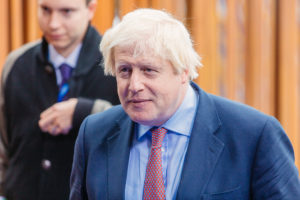Boris Johnson: No Healer of Nations
 Boris Johnson (photo by Arno Mikkor)
Boris Johnson (photo by Arno Mikkor) In the new trend of undemocratically electing heads of state, the United States and the United Kingdom seem to be on the vanguard of how far comparable governments can go. It would be a lie to say the past few years haven’t felt like a race-to-the-bottom with regard to intolerance and bigotry.
Brexit preceded the election of Donald Trump to the presidency by just a few months. At Brexit’s center were far-right champions, including Nigel Farage, Dominic Cummings, Matthew Elliott, and former London mayor Boris Johnson. Johnson became foreign secretary under Prime Minister Theresa May. As a top-tier Brexit-trumpeter, Johnson’s role as the UK’s top diplomat was disconcerting. Now that he is prime minister, a second referendum is entirely out of the question, and the road to Brexit will continue to be rocky.
Johnson, painted as a charming subversive by the nation’s media, campaigned aggressively for the UK to leave the European Union (EU). He famously campaigned for the leave option, saying that the UK would divert funds the country currently gives to the EU to the National Health Service. Johnson wasn’t penalized for plastering the inaccurate and misleading claim across the side of the bus.
The major promise of newly minted Prime Minister Johnson is a “do or die” Brexit by October 31 of this year. How Johnson proceeds with successfully executing Brexit, and what style of Brexit it will be (no-deal, soft exit, hard exit, etc.) will be something to pay close attention to in the coming months. Naming a deadline means that, like May’s previous Brexit proceedings, decisions will be rushed and necessary negotiation pieces will fall to the wayside in order to meet the aptly spooky October 31 deadline.
Everything about Johnson just speaks chaos, from his policy stances to his attire, to the fact that he actively reminded dignitaries from Myanmar of British colonial rule by reciting a Rudyard Kipling poem with strong racial undertones. He certainly was not reciting “The Road to Mandalay” out of respect.
It is worth noting the parallels between Trump and Johnson. Both, it could be argued, came to power undemocratically. Both make a spectacle of themselves and their country in media appearances. Both have unique hairstyles. However, the most notable is their shared history of anti-Muslim and xenophobic statements.
John Oliver had a recent segment about Johnson that explored the potential hazards of the UK’s new leader. Oliver detailed the tactics Johnson uses to present his deplorable policies in a charming manner. The Last Week Tonight segment touched on how Johnson wants to look like a mess, with eccentric, chaotic outfits and ruffled hair, as a means to distract from his problematic views.
Johnson’s comments range from calling Islamophobia a natural reaction, to claiming Islam is “the most viciously sectarian of all religions” to a book he wrote where he claimed that “Muslim grievance” was a factor in the demise of the Roman Empire, apparently proving that Islam directly contradicts Western ways of life.
In a 2007 essay titled “And Then Came the Muslims,” Johnson laments that Islam is countercurrent to progress and the spread of democracy:
There must be something about Islam that indeed helps to explain why there was no rise of the bourgeoisie, no liberal capitalism, and therefore no spread of democracy in the Muslim world.
It is extraordinary to think that under the Roman/Byzantine Empire, the city of Constantinople kept the candle of learning alight for a thousand years, and that under Ottoman rule, the first printing press was not seen in Istanbul until the middle of the nineteenth century. Something caused them to be literally centuries behind.
Unfortunately, this is just the tip of the nightmarish iceberg. Johnson’s strategic calculation paired with his bigoted sentiment make him a threat to democracies the world over. Even dismissing his comments in the face of his intentional buffoonery, there is a scary level of sociopathy underlying Johnson. The fact that he is well aware of the chaos of his actions makes him a great danger, not a healer. His actions are intentional and much more malice-driven than May’s, which does not bode well for the United Kingdom.
However, the control he has over policy may quickly dwindle. The Conservatives, Johnson’s political party, lost the country’s most recent special election, which means that the coalition that granted Johnson the ability to become prime minister and form a government now only holds one seat. Johnson’s window to make Brexit a reality may be closing fast. The UK may have a second referendum option if a new election is forced. However, Johnson’s government may act very swiftly and messily to bring about Brexit, which will cause ample collateral damage today and further down the road.
